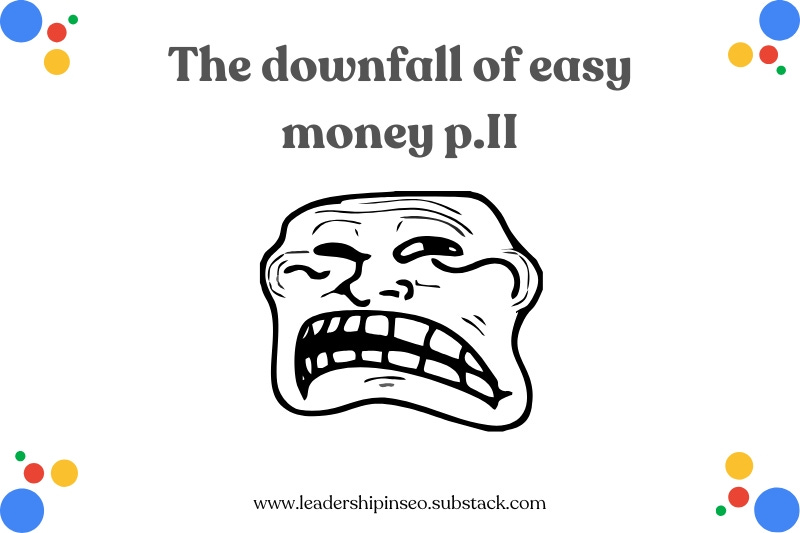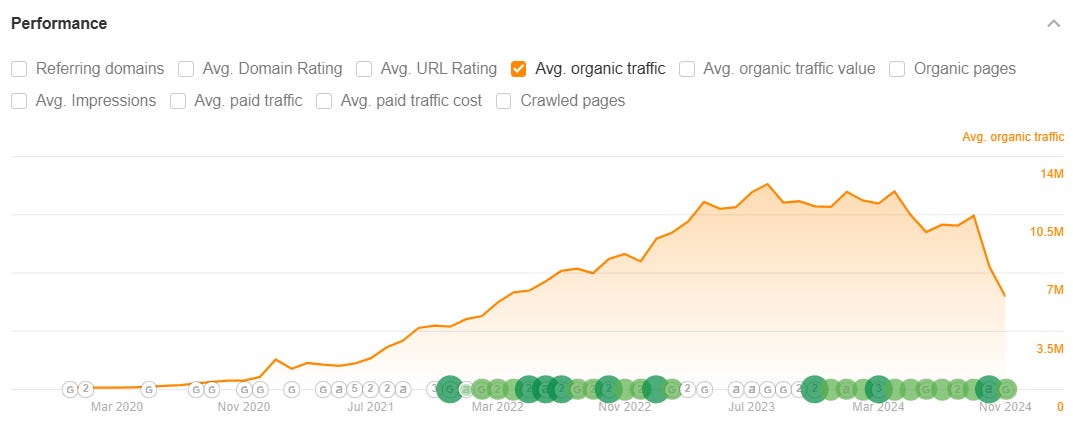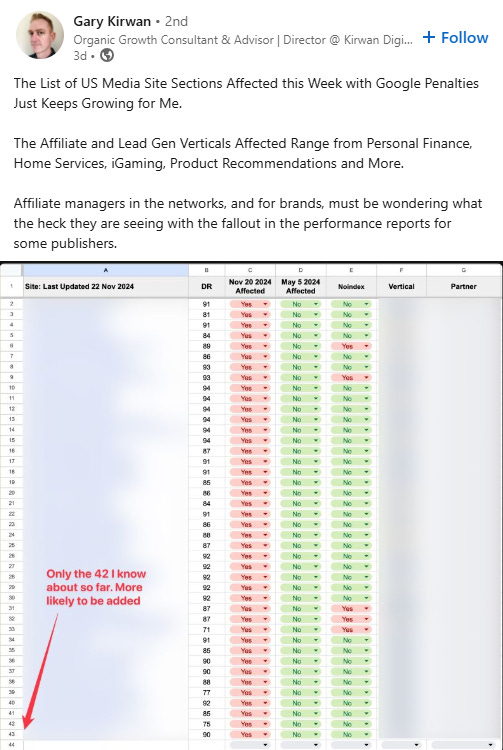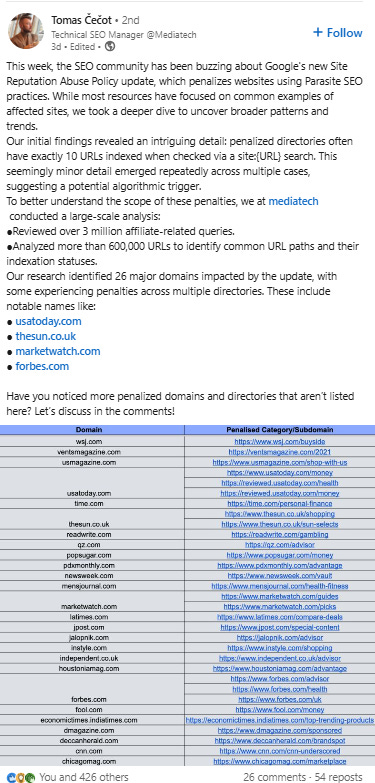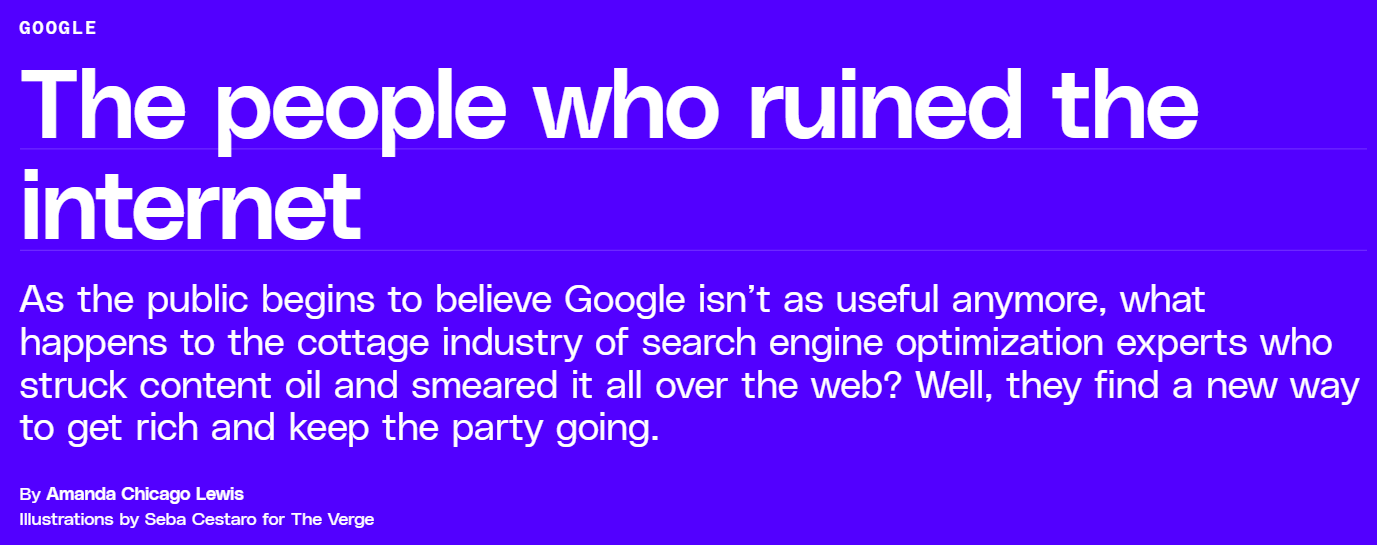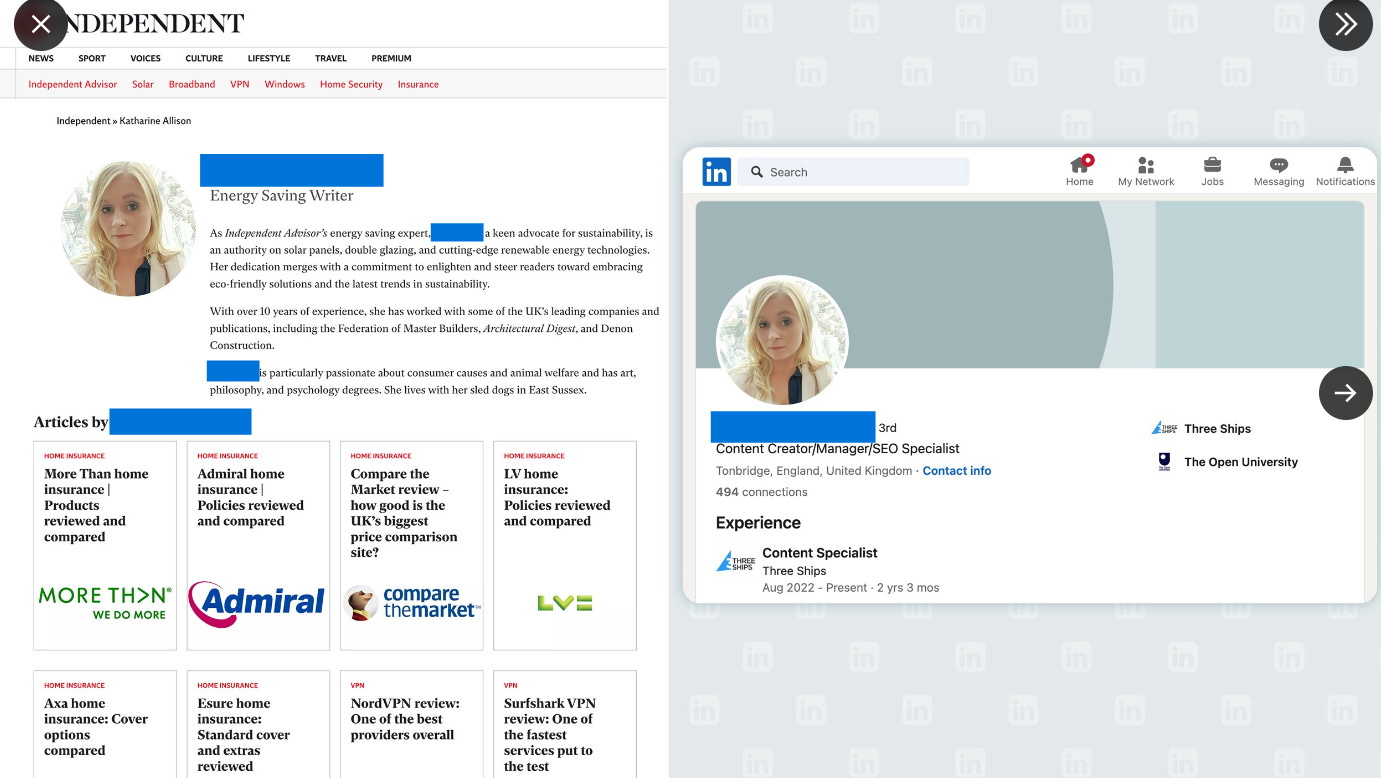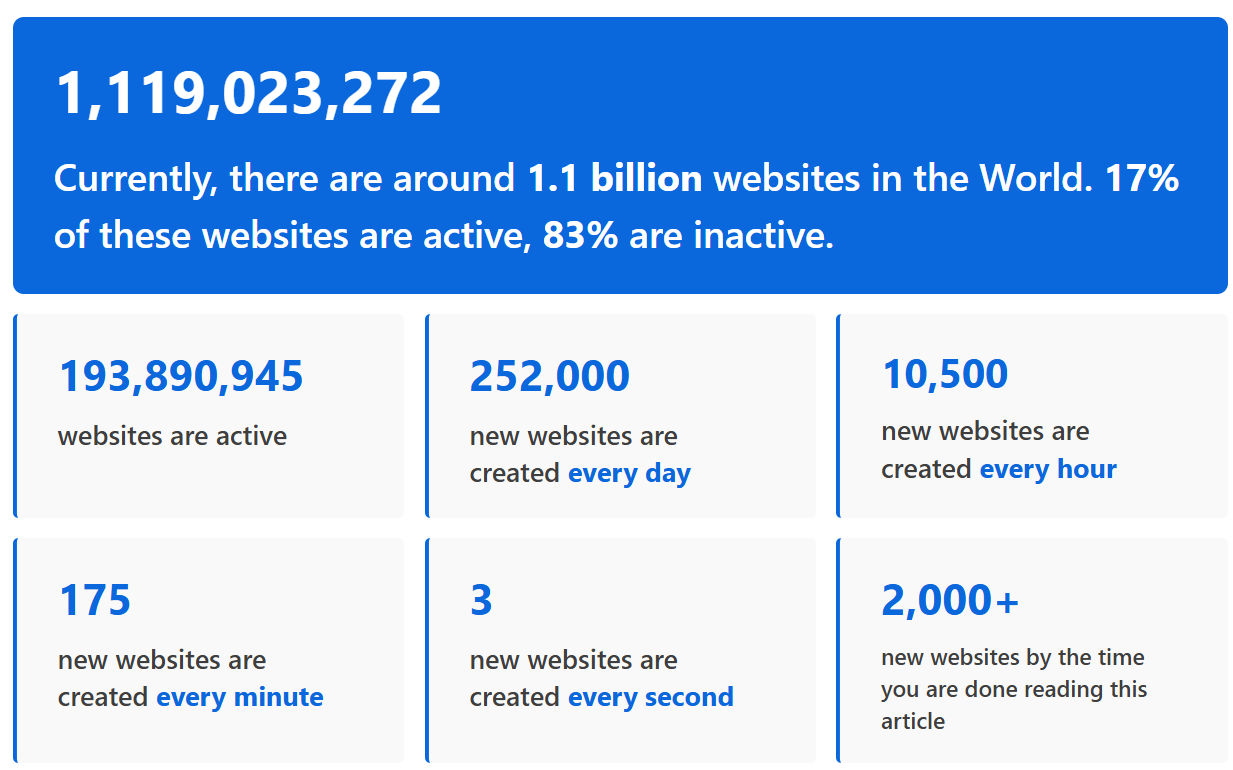The downfall of easy money p. II
After the follow up bout of manual actions, we take another look at how SEOs have killed the internet
What’s happened?
Google has released an updated version of their site reputation abuse guidelines, dishing out dozens of manual actions to mainly third-party affiliate hubs. Decimating publisher revenue and putting hundreds of jobs at risk.
But I don’t think they’re wrong to do it. Although they certainly handled it with all the grace and decorum of a thumbless primate trying to do the washing up.
Smashed crockery and shit all over the walls.
Recently I was describing the situation to a friend. I was telling him how Google has penalised a number of publishers who have ‘stepped outside of their zone.’ Working with third parties to create average quality, rushed and even biased content that erodes trust with users. So much so in fact, that Google has had enough and dished out penalties to everyone working in this manner.
I showed him a couple of examples and do you know what he said?
“Welcome to the internet.”
Sometimes I forget people don’t look at this stuff like you or I.
If you haven’t read part 1, I highly suggest returning to do that. Not just because it’s the best article I’ve ever written. A hell of a statement I know. I mean, you’re talking to someone who has written at least 80 articles about the ins and outs of sea fishing in a different life. A life before the Helpful Content update.
Simpler times.
What do the updated guidelines say?
Google’s updated Site Reputation Abuse policy is a step up from their original March 2024 Spam Update. It’s clearer. The language is more direct.
“Earlier this year, as part of our work to fight spam and deliver a great Search experience, we launched a spam policy to combat site reputation abuse. This is a tactic where third-party content is published on a host site in an attempt to take advantage of the host's already-established ranking signals…
Our evaluation of numerous cases has shown that no amount of first-party involvement alters the fundamental third-party nature of the content or the unfair, exploitative nature of attempting to take advantage of the host's sites ranking signals.”
This model of content publishing is dead. Certainly in its current format. Third parties who have good SEO skills, solid publishing capabilities, but without the brand or domain to compete.
I’ve been pretty clear on what I think the problems are with this content model. And anything that’s too easy should be evaluated much more carefully. From SEOs and business leaders. There’s no such thing as a free lunch.
Scran a few appetisers and get the hell outta dodge.
What’s changed?
In the March 2024 Spam Update, Google gave publishers a couple of months warning; we’re coming for your third party content. In its guidelines, the search giant said;
Improve the quality of search by showing less content designed to attract clicks and more content that people find useful (a reminder that ‘good’ content may not be ‘Helpful’)
As part of our new Spam Policies, we’re targeting expired domain abuse, scaled content abuse and site reputation abuse
Site reputation abuse is when third-party pages are published with little or no first-party oversight
Where the third party looks to take advantage of the host’s domain strength, taking advantage of their ranking signals
Content produced without close oversight of the first party
You see. Vague. Content ‘less likely to attract clicks.’ Content produced ‘without close first party involvement.’ It’s vague because they weren’t sure exactly how this would unfold. What they’d find.
Fast forward seven months and we have arrived at ‘no amount of first-party involvement alters the exploitative nature of taking advantage of the host’s ranking signals.’
Google created the system. When people worked out how to play the game, they changed the game.
Google moved the goalposts
Now, I have a real problem with how Google went about dishing out follow-up manual actions. Not because I don’t agree with it in principle. I do. The search results speak for themselves.
To give some credit, I think Google tried to change things algorithmically earlier this year. Huge publishers like Forbes saw substantial drops before this update. But maybe it wasn’t enough and they felt manual actions were the answer. Again. The world’s most expensive algorithm working like a call centre circa 2001.
The less said about forum results the better frankly. They have value. Definitely. I think real experiences are brilliant. But they’re not the answer. Not for everything.
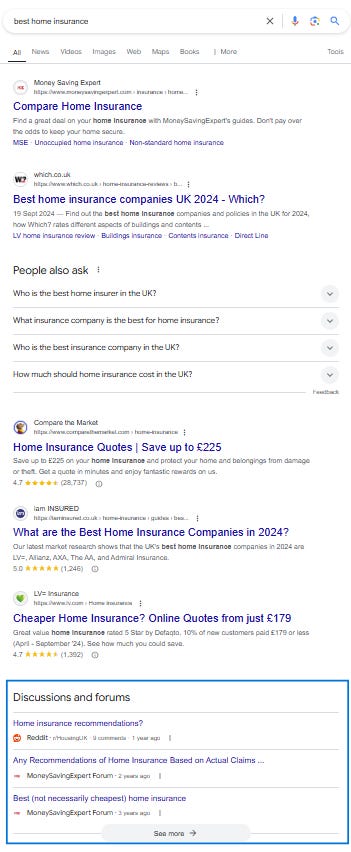
The problem I have with Google here is that publishers and affected third parties have spent the last six months or more looking at alternatives. Honestly is there any other example where ambiguous examples were changed overnight and millions of pounds were lost the next day? Naturally people have been experimenting and rightly so.
But this new update has completely pulled the rug out from under their feet. No prior warning. No extra guidance or advice. Just the old cold shoulder. Frankly, it’s a shambles. You’ve built a system that feeds off content production. Constant updates. And the people that bring you that in droves (publishers) get hammered with no prior warning.
Whilst the HCU came and went, in its own way this is just as damning.
Which sites have been hit?
I covered a number of the big ones in my previous post. Forbes, CNN, Time, et al. I started going through the big ones before Gary Kirwan highlighted there have been 42 and counting.
And whilst Tomas Cecot and the Mediatech team didn’t find quite as many, they did highlight the brands and sections that have been affected.
Since this last update, you can add The Independent, The Sun and a few other huge UK publishers alongside local publishers like the LA Times and Chicago Mag. I use ‘local’ in the US sense of the word.
Almost all of those affected had at least one foot in the personal finance space. An area Google has been pretty guarded with since the whole YMYL thing. Even sites like The Motley Fool and Marketwatch - brands with an obviously financially slanted backlink profile and financial expertise - have been hit.
Although I do think that anyone going to Motley Fool for advice on the best credit cards may have lost the plot slightly.
What’s gone wrong?
There was an article on The Verge about how SEOs have ruined the internet. Rather disparagingly we were referred to as ‘the people.’
Like or dislike the Saudis, their recent and ongoing diversification of their near trillion dollar oil empire is something to behold. Third parties who ‘plug in’ to big brands could learn a thing or two. Adapt or die. The oil won’t be around forever.
After spending weeks diving into this topic, I don’t entirely disagree. I’ll stop short of saying I agree because I rely on both SEO and the internet to make ends meet. But they’re right.
As an industry, we have spun the same content in many ways and across many sites. No uniqueness. No to little creativity. Over-optimised headlines. A comparison table and, most worryingly of all, no actual knowledge on the subject. A subject that includes credit cards, home insurance and health insurance. You name it. All things that could genuinely impact a famili’s wellbeing. We all need to do better.
Let me give you an example. Three Ships work with around 10 of the companies that the Site Reputation Abuse update has hit. So to combat the rule about working with third parties, Three Ships pretended their writers were in-house specialists for the brand.
Which is exactly what Google said would happen.
It’s a bit of a hail mary and you can’t entirely blame them. But I think we as big publishers need to set higher standards for ourselves and the content we produce. It just isn’t good enough.
On further investigation, I know that Three Ships have worked with Mens Journal, Independent Advisor, USA Today, Marketwatch and others who haven’t made the above list including Architectural Digest, Fortune and, incredibly, both the National Council for Aging and the World Economic Forum.
So, what should you do?
Hold ourselves to higher standards. The days of easy money are gone. There will always be another PBN, domain redirect or promise of big bucks for little to no investment.
It’s our job to decide whether it’s the right thing to do for the long-term health of your brand. Hell, for the internet. You need to influence people who smell the money and talk them down from the ledge on occasion.
The web is getting ever bigger. According to Siteefy over 250,000 websites are created every day. Every day. And how many of those do you think are good?
Google’s resources aren’t finite. Every new page costs something. They are being pickier with what they deem worth indexing and third party content created by the same few third parties isn’t it.
So we need to hold ourselves to higher standards, diversify income streams as much as possible and prepare ourselves for the worst. One thing’s for sure, off the back of this last update you might lose millions of pounds overnight.





